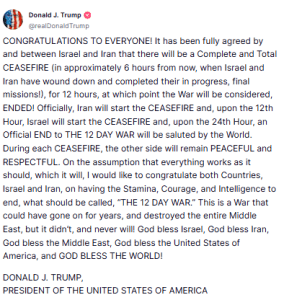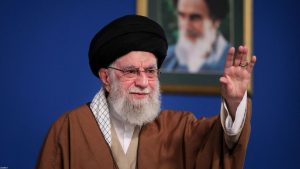Washington D.C. – Once again, Donald Trump has stepped forward to declare a ceasefire between warring nations before the actual participants have agreed to any such arrangement. In a pattern that’s becoming increasingly familiar, Trump Announces Iran-Israel Ceasefire despite clear indications that neither Israel nor Iran had reached any mutual agreement to end hostilities. This marks the second instance where the U.S. President has unilaterally proclaimed peace without the consent or confirmation of the involved parties.
The announcement came through Trump’s Truth Social platform on Monday, where he declared a “complete and total” ceasefire between Israel and Iran. However, the timing and circumstances surrounding this declaration raise serious questions about the President’s approach to international diplomacy and his tendency to announce outcomes before they materialize.
The Questionable Timing of Trump’s Announcement

Trump Announces Iran-Israel Ceasefire came at a particularly suspicious moment – just minutes after both sides had threatened new attacks against each other. Rather than waiting for actual diplomatic progress or genuine commitment from both nations, Trump appeared to preemptively declare success in a conflict that was still actively escalating.
The President’s statement on Truth Social read: “On the assumption that everything works as it should, which it will, I would like to congratulate both Countries, Israel and Iran, on having the Stamina, Courage, and Intelligence to end, what should be called, ‘THE 12 DAY WAR’.” The phrase “on the assumption that everything works as it should” reveals the speculative nature of this announcement.
This premature declaration pattern raises fundamental questions about presidential credibility and the potential consequences of announcing foreign policy victories before they’re actually achieved. When Trump Announces Iran-Israel Ceasefire without proper groundwork, it undermines the careful diplomatic processes typically required for genuine conflict resolution.
Iran’s Explicit Rejection of Ceasefire Proposals


Perhaps most troubling about this latest episode is that Trump Announces Iran-Israel Ceasefire despite clear evidence that Iran had not agreed to any such arrangement. CNN reported, shortly before Trump’s announcement, that Iran had not received any ceasefire proposal and saw no reason for one, according to a senior Iranian official.
Also Read: Netanyahu On Iran-Israel Conflict: Reveals When Fighting Will Stop….
This contradiction between Trump’s public declaration and Iran’s actual position highlights a concerning disconnect between presidential rhetoric and diplomatic reality. When Trump Announces Iran-Israel Ceasefire while one of the primary parties explicitly states they haven’t even received a proposal, it suggests either a failure in communication or a deliberate misrepresentation of the situation.
The Iranian rejection of any ceasefire discussion makes Trump’s announcement appear not just premature, but potentially counterproductive to actual peace efforts. Diplomatic sources indicated that Iran saw no justification for ending their military response, making the presidential ceasefire declaration seem divorced from the ground reality.
Israel’s Conspicuous Silence


Adding to the questionable nature of this announcement is Israel’s complete lack of response to Trump’s ceasefire declaration. Trump Announces Iran-Israel Ceasefire, yet there was no immediate comment from Israeli officials confirming or supporting this supposed agreement.
While three Israeli officials had reportedly signaled to the United States that Israel was looking to wrap up its campaign in Iran soon, this falls far short of the definitive ceasefire commitment that Trump’s announcement implied. The absence of any Israeli confirmation suggests that Trump Announces Iran-Israel Ceasefire was more about creating a desired narrative than reflecting actual diplomatic achievement.
This silence from Israel is particularly significant given the country’s typically rapid response to major diplomatic developments. When Trump Announces Iran-Israel Ceasefire without Israeli confirmation, it raises questions about whether proper diplomatic channels were even consulted before the public declaration.
The Pattern of Premature Victory Declarations

This incident represents a troubling pattern where Trump Announces Iran-Israel Ceasefire and similar international agreements before the involved parties have actually committed to them. The approach of declaring victory first and hoping for compliance later represents a fundamental departure from traditional diplomatic practice.
The consequences of this approach extend beyond mere embarrassment. When Trump Announces Iran-Israel Ceasefire prematurely, it can complicate actual peace negotiations by creating unrealistic expectations or pressuring parties into positions they haven’t agreed to adopt.
Market Reactions to Unsubstantiated Claims
Interestingly, financial markets appeared to respond positively to Trump’s announcement, with S&P 500 futures rising 0.4% late Monday in anticipation of market gains. However, this market reaction was based on the assumption that Trump Announces Iran-Israel Ceasefire represented a genuine diplomatic breakthrough rather than a unilateral declaration.
This market response highlights the real-world consequences of presidential statements, even when they lack substantive backing. When Trump Announces Iran-Israel Ceasefire without proper foundation, it can create artificial market movements based on false premises.
The Staged Process That Never Materialized
Trump’s announcement suggested that the ceasefire would begin through a “staged process” after both sides completed their ongoing missions. However, Trump Announces Iran-Israel Ceasefire without any evidence that either side had agreed to this timeline or framework.
The vague reference to allowing time for mission completion while simultaneously declaring a ceasefire reveals the contradictory nature of the announcement. When Trump Announces Iran-Israel Ceasefire with such ambiguous terms, it suggests the declaration was made without proper diplomatic groundwork.
International Diplomatic Implications
The repeated pattern where Trump Announces Iran-Israel Ceasefire without participant agreement has broader implications for U.S. diplomatic credibility. International partners may become skeptical of American announcements if they consistently precede actual agreements rather than reflect them.
This approach risks undermining genuine diplomatic efforts by creating confusion about what has actually been agreed upon versus what the U.S. President hopes will be agreed upon. When Trump Announces Iran-Israel Ceasefire prematurely, it can complicate the work of actual diplomats trying to broker real agreements.
Questions About Presidential Authority
The incident raises important questions about the limits of presidential authority in international affairs. While Trump Announces Iran-Israel Ceasefire, the practical question remains whether such unilateral declarations serve any constructive purpose when the supposed parties to the agreement haven’t actually agreed.
Closing Remarks: A Pattern of Premature Declarations
This latest episode where Trump Announces Iran-Israel Ceasefire without proper diplomatic foundation continues a concerning pattern of declaring victory before achieving actual results. The absence of Iranian agreement and Israeli confirmation suggests this announcement was more about political messaging than genuine diplomatic achievement.
The fundamental question remains: why does this pattern persist? When Trump Announces Iran-Israel Ceasefire for the second time without participant consent, it suggests either a misunderstanding of how diplomacy works or a deliberate choice to prioritize announcements over actual results. Either explanation should concern those who value effective international relations and genuine conflict resolution over premature victory declarations.

